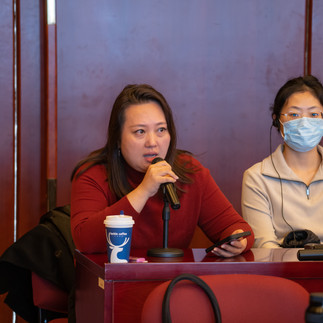Europe-Asia Center: Strategic Partnership with the Chinese Academy of International Trade and Economic Cooperation to Strengthen EU-China Trade Ties
- Europe-Asia Center

- Nov 4, 2024
- 3 min read
Brussels, November 4th, 2024
On Wednesday, October 30, 2024, a high-level delegation of the Europe-Asia Center visited the Chinese Academy of International Trade and Economic Cooperation (CAITEC) in Beijing, and signed a Memorandum of Understanding (MOU) to explore synergies and deepen collaboration between the two institutions. The meeting further included an insightful and frank discussion on the challenges and opportunities in current EU-China trade relations, as well as a Q&A session with MBA students from CAITEC.
In her opening address, H.E. Dr.hc. Violeta Bulc, Vice-Chair of the Europe-Asia Center and former EU Commissioner for Transport and Mobility, emphasized the importance of overcoming longstanding trade barriers between the EU and China, called on Western countries to move beyond current sanction-based approaches, and encouraged Chinese companies to invest and create jobs in Europe.
“I hope that I speak in the name of all of us that it is the time to go beyond, and I think the environment of our society is inviting us to do so. In my view, creating or increasing trade barriers will not lead to greater happiness or prosperity for Europeans. Instead, fostering trade and sharing knowledge will be more beneficial.”

H.E. Fabrizio Hochschild, Special Advisor to the Board of the Europe-Asia Center and former Under-Secretary-General of the United Nations, highlighted the importance of education and youth in promoting mutual understanding between EU and China, and expressed hope that the signing of the MOU between CAITEC and the Europe-Asia Center would facilitate future dialogues.
“I believe the Europe-Asia Center, with its strong foundation of mutual understanding, will positively influence the path forward. Millions of young people from rural areas in China to southern Europe share similar hopes and dreams, which we must build upon.”

H.E. Ambassador Piet Steel, Board Director of Special Olympics Int. and former Chairman of the Europe-Asia Center, revealed that in contrast to the past, trade and politics were now closely linked, highlighting that they had to be tackled simultaneously, and expressed his disagreement with the current EU partner-competitor-rival triptych.
“I don’t want to go into all the discussions on whether we are partners or competitors. We are partners and competitors. We are partners because we need to work together in plenty of aspects such as facing climate change. We are competitors just like when in my country many people are in the same business.”

H.E. Yu Yuantang, Director-General of the European Department of the Chinese Ministry of Commerce (MOFCOM), expressed that China had not sought to exploit the trade surplus with Europe, and that Europe should reconsider the current approach of securitization and politicization of trade.
“It is unwise to impose high tariffs and sanctions on Chinese electric vehicles without mutual discussion. In other words, EU’s high tariffs and sanctions implemented on Chinese electric vehicles are not consistent with the world trade regulations. We should find peaceful negotiations and proper settlements for trade issues by working together under multilateralism, and a free global economic order is necessary and crucial.”

Yu Miao, Director at the European Department of MOFCOM, highlighted the importance increased dialogue and trade negotiations to achieve win-win outcomes.
“Intensifying and underlining the economic imbalance will not be helpful. We need to agree on more specific terms concerning the products we export and import to each other. Through negotiations rather than a trade war will provide opportunities to promote win-win cooperation.”

Cui Hongjian, Director of the Department for European Studies at the China Institute of International Studies and Professor at the Higher Institute of Regional and Global Governance at Beijing Foreign Studies University, indicated that geopolitical issues call for innovative solutions that can overcome the challenges in EU-China trade relations, and we should build more bridges for both sides to prompt smooth cooperation.
“Trade relation is the combination of politics and diplomacy, which motivate us to find a way to share our strengths promoting mutual benefits and understanding. Both sides should take more steps.”

After this high-level exchange, MBA students of CAITEC seized the opportunity to ask questions to the speakers. In response to a question from a young male student about the likelihood of a trade war between the EU and China, both Madame Bulc and Mr. Steel expressed confidence that European and Chinese leaders would show enough wisdom to prevent such developments. Moreover, responding to a young female student, Mr. Hochschild outlined the possibilities to enter the United Nations for young graduates, and encouraged all attending students to apply for internships or the UN’s Young Professional Programme.
For press enquiries:
Jonathan Schwestka, Deputy Director for Europe, Europe – Asia Center








































